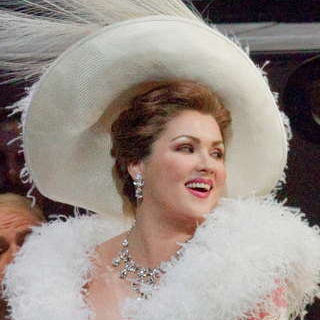 SPONSORED: Vocal Glory - Massenet's Manon in HD from New York Metropolitan Opera, enjoyed by Maria Nockin.
SPONSORED: Vocal Glory - Massenet's Manon in HD from New York Metropolitan Opera, enjoyed by Maria Nockin.
All sponsored features >>
- Silvius Leopold Weiss
- Larry Sitsky
- Turangalîla
- Frederic Wake-Walker
- Marc'Antonio Ingegneri
- Marilyn Mason
- Gegham Grigoryan
- Stravinsky: The Rake's Progress
 DISCUSSION: What is a work? John Dante Prevedini leads a discussion about The performing artist as co-creator, including contributions from Halida Dinova, Yekaterina Lebedeva, Béla Hartmann, David Arditti and Stephen Francis Vasta.
DISCUSSION: What is a work? John Dante Prevedini leads a discussion about The performing artist as co-creator, including contributions from Halida Dinova, Yekaterina Lebedeva, Béla Hartmann, David Arditti and Stephen Francis Vasta.
A Sleek, Focused Sound
MIKE WHEELER reports on Opera North's production of Bizet's 'Carmen' in Nottingham
Who is Bizet's Carmen - good-time girl? femme fatale? emotionally damaged and needy child? Strauss's Salomé and Janáček's Vixen Sharp-ears rolled into one? All of these? Whatever the answer, Opera North's new production - Theatre Royal, Nottingham, UK, 17 and 19 November 2021 - attempts a radically different viewpoint from usual. Director Edward Dick claims in the programme that 'Carmen is often strangely invisible within her own story'. It's good to get away from the clichés, but that's never been my impression, however conventional the production.
The action is relocated to an unspecified border town in the American south, sometime around the early 1960s. An androgynous Lillas Pastia (Nando Messias) runs a burlesque joint where Carmen, surrounded by eye-watering shades of pink, is the star performer.
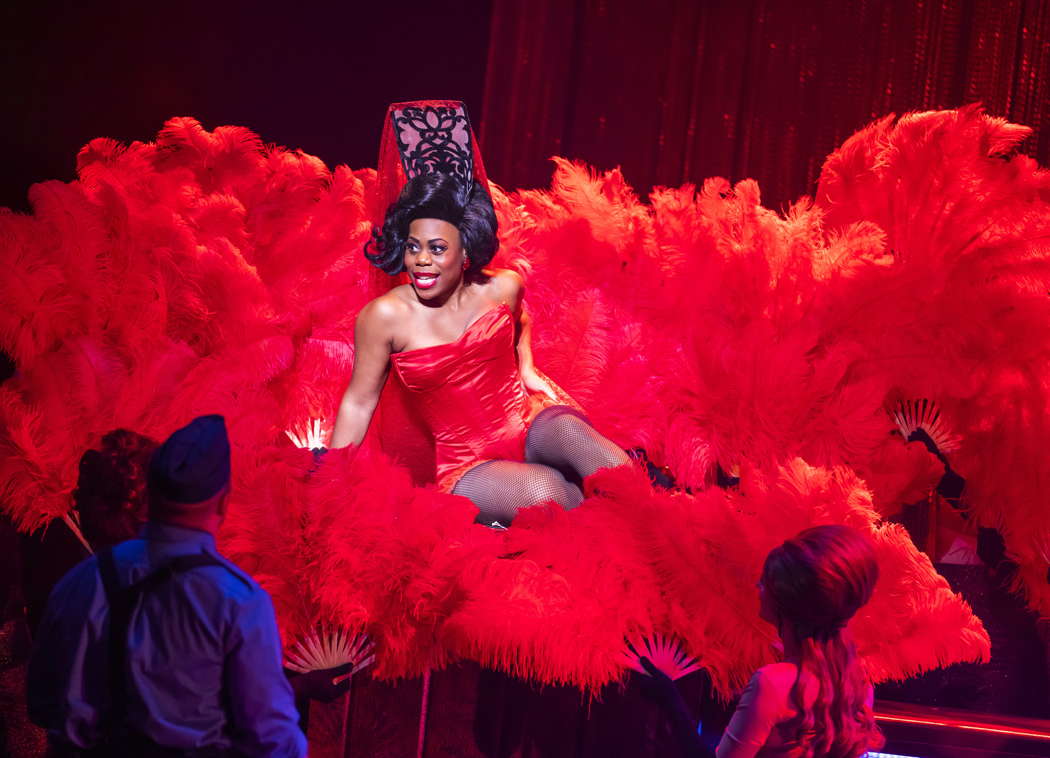
Chrystal E Williams as Carmen. Photo © 2021 Tristram Kenton
It is where Lt Zuniga's soldiers hang out when off-duty. (As in Opera North's previous production, the changing guard scene is cut.) It is also the cover for some serious drug-smuggling. Colin Richmond's set is dominated, much of the time, by a huge neon sign spelling GIRLS - OK, point taken.
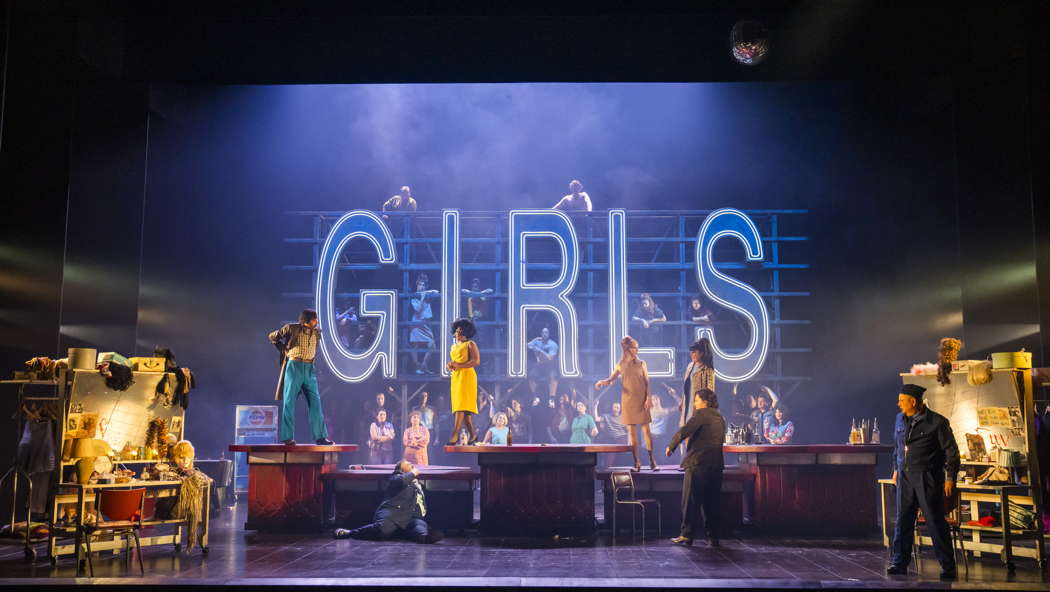
Dean Robinson as Dancairo, Matthew Stiff as Zuniga, Chrystal E Williams as Carmen, Amy Freston as Frasquita, Helen Évora as Mercedes, Stuart Laing as Remendado and Erin Caves as Don José in Opera North's production of Bizet's Carmen. Photo © 2021 Tristram Kenton
The idea of the split between Carmen's real self and 'La Carmencita' - her public persona, tailored to the clientele's expectations - is one worth exploring, but there are too many moments when details of the staging fail to convince. Carmen makes her first appearance let down from the flies on a swing, as part of her act. Fair enough, but she also uses it to make her escape at the end of Act I. No doubt this is to give her an air of calm self-possession, but it falls flat - the action is too slow, with nowhere near enough pandemonium to give her cover.
Her Act II scene with Don José takes place in her dressing-room. As he prevaricates over returning to barracks, she reaches exasperation-point, snatching her wig off and sweeping bottles and jars off the table. It's a startling moment, which could have been a signal that the production was beginning to go somewhere emotionally, but it doesn't last. Escamillo is a rodeo rider who is also a country-and-western star on the side. But he's still singing about life as a toreador. Is he just fantasising?
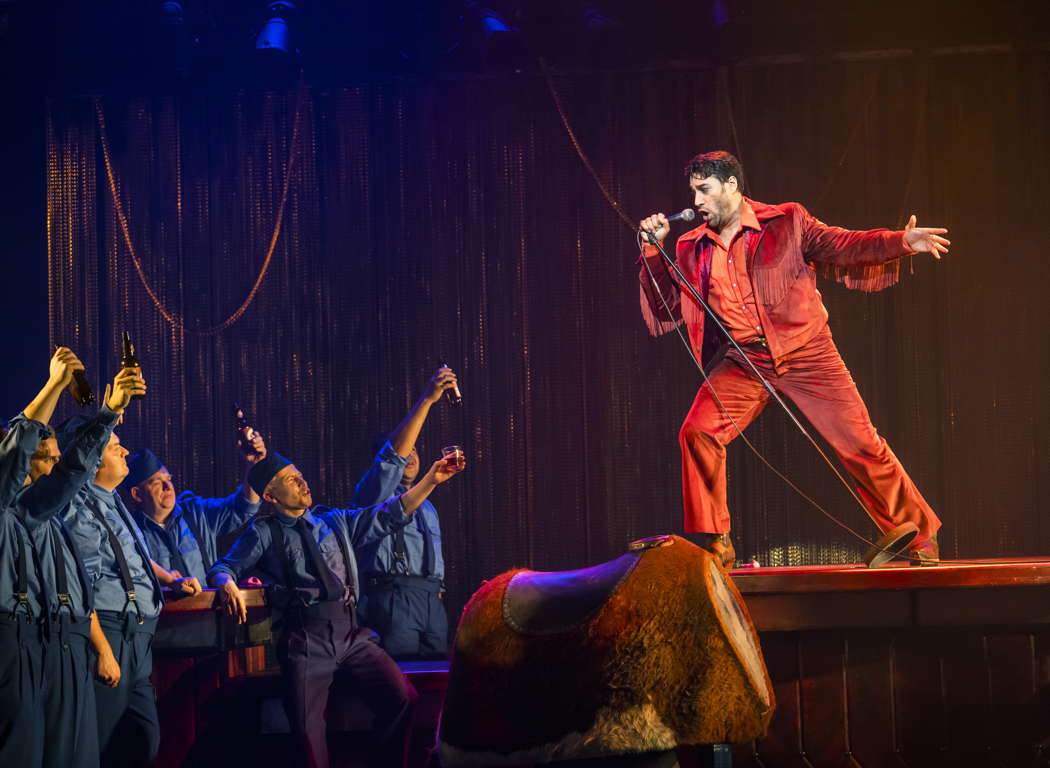
Phillip Rhodes as Escamillo with members of the Chorus of Opera North in Bizet's Carmen. Photo © 2021 Tristram Kenton
In the title role, Chrystal E Williams, a mezzo with considerable vocal warmth, effortlessly commands the attention of both the on-stage characters and the audience. Erin Caves' rather geeky Don José uses his lyrical tenor to good effect, particularly in his 'Flower' aria, though he doesn't fully convey the desperation of someone way out of his emotional depth in later scenes. In Act III, his fight with Escamillo is oddly tame. Phillip Rhodes conveys something, but not really enough, of both Escamillo's appeal and his egotism.
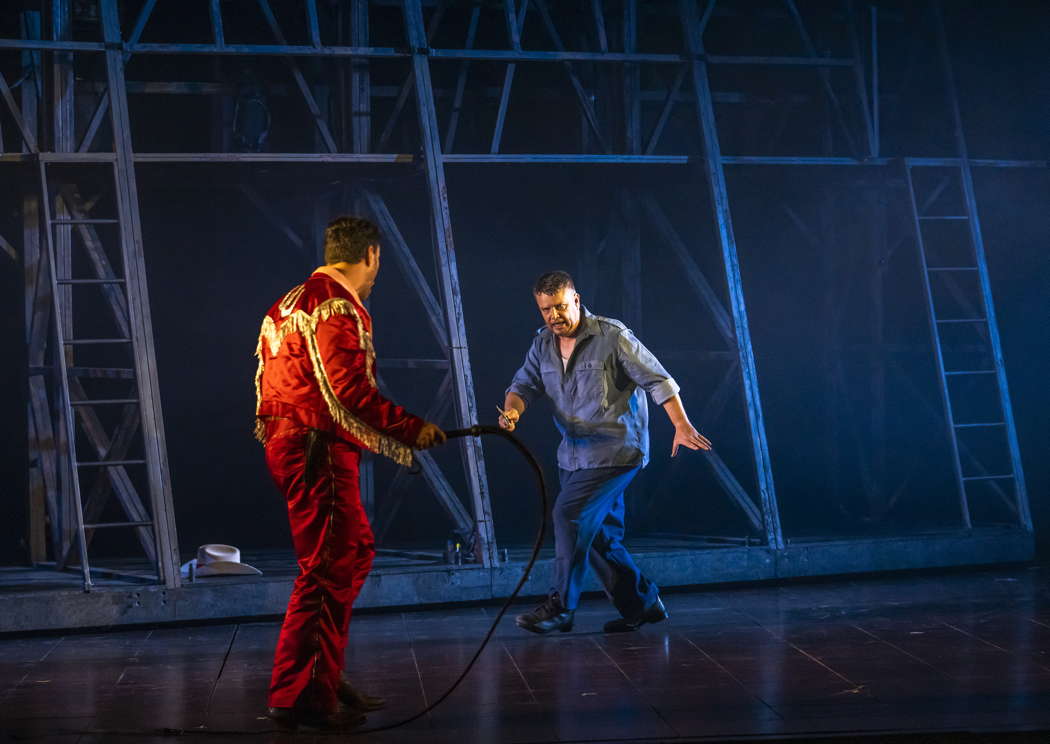
Phillip Rhodes as Escamillo and Erin Caves as Don José in Opera North's Carmen. Photo © 2021 Tristram Kenton
Camila Titinger is a more worldly Micaëla than we usually see. She is pregnant with (we assume) Don José's child, for one thing, which suggests sides to both their characters not often considered. Her voice conveys her uncertainty, in both her Act I and Act III appearances, but she tends to rely too much on off-the-peg arm gestures.
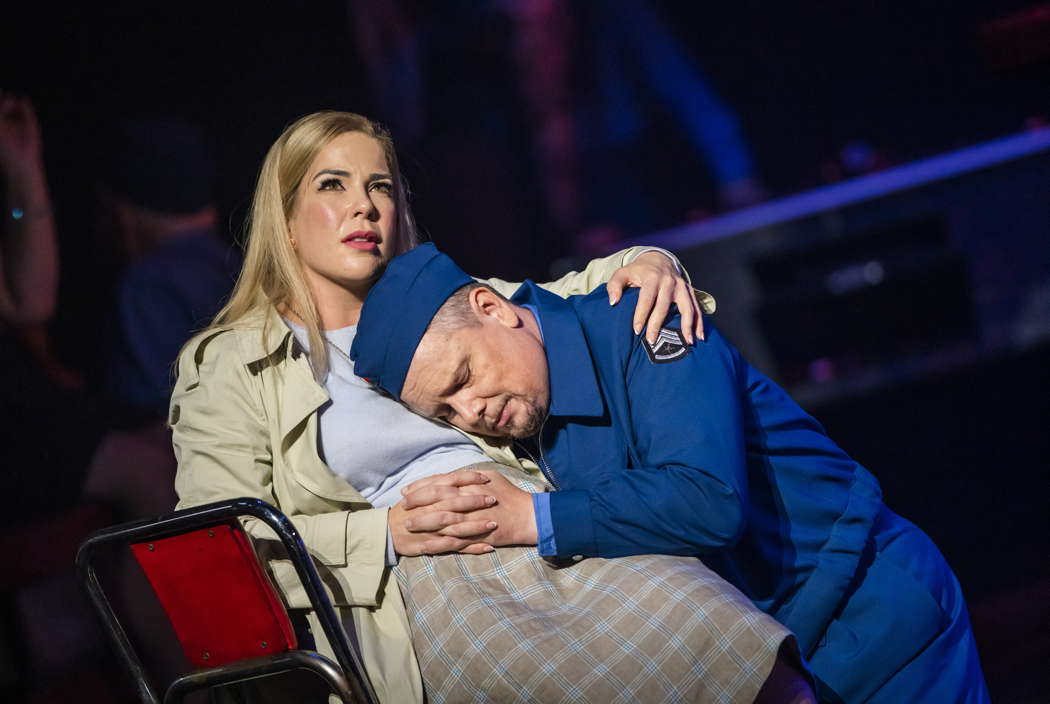
Camila Titinger as Micaëla and Erin Caves as Don José in Opera North's Carmen. Photo © 2021 Tristram Kenton
Natasha Argawal (standing in for an indisposed Amy Freston) and Helen Évora are lively enough as Frasquita and Mercédès, particularly in their fortune-telling duet. (A fruit machine - whose wheels don't spin for some reason - stands in for the pack of cards.) Stuart Laing and Dean Robinson give smugglers Remendado and Dancairo, respectively, just enough seediness to be credible. Matthew Stiff's Zuniga is little more than a gross bully.
A lack of dramatic tension on stage is made up for in the pit, though. The Opera North Orchestra produces a sleek, focused sound, right from their sprightly account of the Prelude. (Harry Sever conducted the two Nottingham performances.) The members of the Opera North Chorus give it their all vocally, as they always do, and turned in some enthusiastic line-dancing amid falling balloons to celebrate Escamillo's arrival in Act IV.
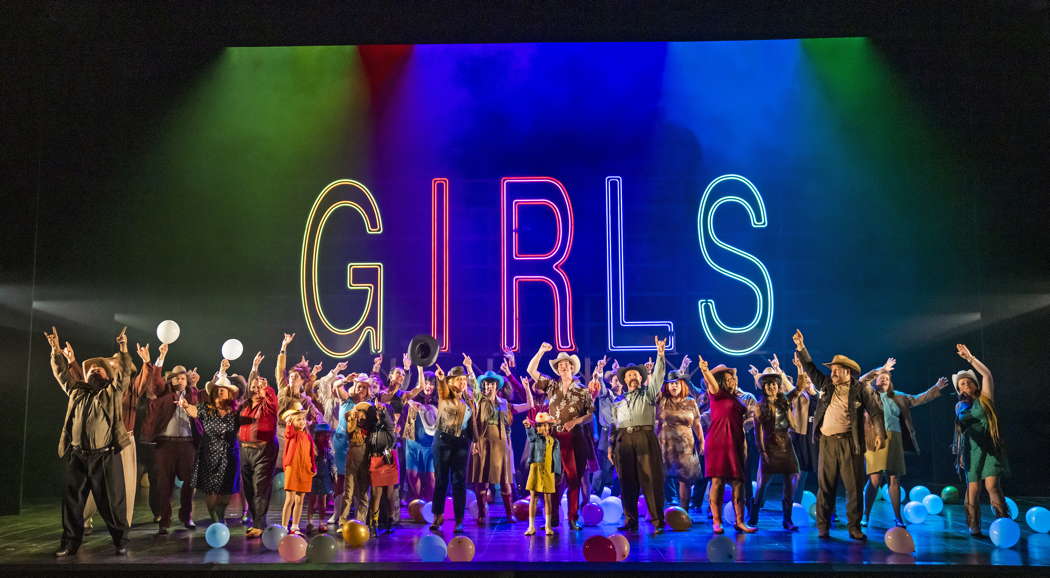
The Chorus of Opera North and Company of Carmen. Photo © 2021 Tristram Kenton
It's only fair to say that the production was well received by a near-capacity audience, and no doubt there will be some tweaks before the second run of performances (see below), but the problems loom large. Sad to report a rare Opera North misfire, especially in the company's first full season after lockdown. But when the final confrontation between Carmen and Don José is upstaged by a floor full of balloons, you know something's not working.
Copyright © 30 November 2021
Mike Wheeler,
Derby UK

ARTICLES ABOUT BIZET'S 'CARMEN'
ARTICLES ABOUT NOTTINGHAM'S THEATRE ROYAL


